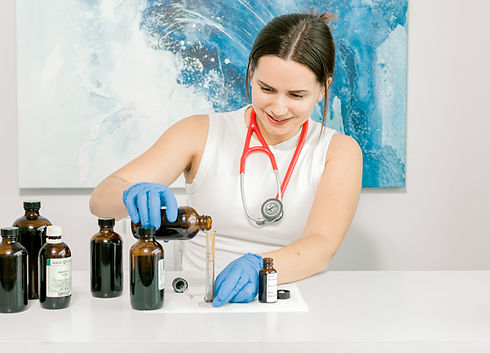IVY Integrative / Services / Herbal Medicine
Herbal Medicine
WHAT IS HERBAL MEDICINE?
IVY Integrative offers botanical therapy in Charlotte, NC. Herbal medicine, also known as botanical medicine, uses plant-based substances to address health issues and promote overall well-being. It has been practiced for thousands of years across various cultures and is still widely used today as an alternative or complementary approach to modern pharmaceuticals. Herbalists use different parts of plants—roots, leaves, flowers, or seeds—based on their natural healing properties. The goal of herbal medicine is to support the body's natural healing mechanisms, helping restore balance and health.

BENEFITS OF HERBAL MEDICINE
Natural and Holistic: Herbal medicine works in synergy with the body’s systems, addressing not just symptoms but also the root causes of health issues.
Fewer Side Effects: Compared to some synthetic medications, herbal treatments generally have fewer or milder side effects, making them a gentler alternative.
Cost-Effective: Herbal remedies are often less expensive than pharmaceutical options.
Preventative Care: Herbs can be used for long-term health maintenance, supporting the immune system, digestion, and more to prevent future illness.
Customizable: Treatment with herbs can be tailored to each individual, making it a flexible approach that meets specific health needs.

HOW HERBAL MEDICINE WORKS
Herbal medicine works by interacting with the body’s systems, tissues, and organs through the bioactive compounds found in plants. These compounds have diverse functions, such as:
Adaptogens: Help the body resist stress.
Antioxidants: Fight free radicals and prevent cellular damage.
Anti-inflammatories: Reduce inflammation, which is at the root of many chronic conditions. Herbalists create formulas that combine herbs to support specific organs or treat certain conditions, considering each person’s unique constitution and health status. By working with the body rather than against it, herbal medicine aims to restore balance and promote natural healing.
Carminitives: Aid in digestion.
Trophorestoratives: Have a healing effect on a specific organ or tissue in the body. These herbs are nourishing and have an affinity for a particular organ or system.

COMMON CONDITIONS TREATED BY HERBAL MEDICINE
Herbal medicine is used to manage a wide range of conditions, including:
Digestive Disorders: Herbs like ginger, peppermint, and chamomile can soothe digestive discomfort, nausea, and bloating.
Hormonal Imbalances: Plants such as chaste tree (vitex) and black cohosh are often used to support hormonal health, including conditions like PMS, menopause, and fertility challenges.
Anxiety and Stress: Adaptogenic herbs like ashwagandha, Rhodiola, and holy basil help the body cope with stress and anxiety.
Insomnia: Valerian root, passionflower, and lavender are commonly used to promote relaxation and sleep.
Immune Support: Echinacea, elderberry, and astragalus are popular for boosting the immune system and helping the body fight infections.
Chronic Pain and Inflammation: Turmeric and willow bark have anti-inflammatory properties that can be beneficial for conditions like arthritis.

WHAT TO EXPECT AT AN HERBAL MEDICINE APPOINTMENT
All of our herbalists are dual trained as naturopathic doctors at IVY Integrative. This means your first appointment lasts around 90 minutes and involves a thorough review of your medical history, lifestyle, and current health concerns. Your herbalist will ask detailed questions about your diet, sleep, stress levels, and physical activity to get a holistic view of your health and will perform any physical exams deemed necessary.
After gathering all pertinent information, your clinician will formulate a personalized herbal tincture, tailored to treat your conditions from our in-house dispensary of over 100 botanical herbs. Tinctures may be prescribed on their own or in combination with other naturopathic supplements. Follow-up appointments are shorter, usually 40 minutes or 20 minutes, and focus on monitoring progress and adjusting the treatment plan as needed.

FAQ
Does Herbal Medicine Have Side Effects?
Herbal medicine is generally considered safe when used under the guidance of a qualified practitioner. However, some herbs can cause side effects, especially if taken in high doses or without professional supervision. For example, excessive amounts of licorice root can increase blood pressure, while St. John’s wort can interact with certain medications. It’s important to consult with a health practitioner to ensure that herbal remedies are appropriate for you and won’t cause harmful effects.
How Long Does It Take to See Results from Herbal Medicine?
The time it takes to see results from herbal medicine varies depending on the individual, the condition being treated, and the specific herbs used. For acute conditions like colds or digestive discomfort, you may notice improvements within a few days. However, for chronic conditions, it may take several weeks or even months of consistent use to see significant changes. Herbal medicine tends to work more gradually than pharmaceuticals, focusing on long-term healing rather than quick fixes.
Can I Take Herbal Medicine with Pharmaceuticals?
In many cases, herbal medicine can be used alongside pharmaceuticals, but it is essential to do so under the guidance of a healthcare provider. Some herbs may interact with medications, either enhancing or diminishing their effects. For example, St. John’s wort can interfere with the effectiveness of antidepressants and birth control pills. If you're already taking prescription medications, it's crucial to inform your herbalist or healthcare provider to avoid potential interactions and ensure that your treatment plan is safe.
Book today for herbal medicine near me!





